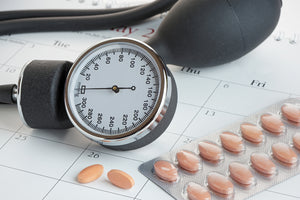Almost half of the population of the United States suffers from some type of cardiovascular disease. In many cases, cholesterol is one of the most significant contributors to cardiovascular disease.
What is Cholesterol?
First and foremost, not all cholesterol is created equal. There are two types of cholesterol, LDL and HDL, which have very different effects on your body.
LDL (low-density lipoprotein) cholesterol
LDL cholesterol is considered "bad" cholesterol. It contributes to the build-up of fat in arteries, also known as atherosclerosis. This narrowing of arteries increases the risk of heart attacks, strokes and peripheral artery disease.
HDL (high-density lipoprotein) cholesterol
On the other side, HDL cholesterol is the "good" cholesterol because it carries the "bad" LDL cholesterol away from arteries and back to the liver to be broken down. So a healthy HDL cholesterol level can help protect you against heart attack and stroke.
It is important to note that HDL cholesterol cannot eliminate all LDL cholesterol as it only carries about one-third to one-fourth of blood cholesterol.
What are Statins?
Statins, known for their cholesterol-lowering effects, have become a cornerstone in managing cardiovascular diseases. These life-saving drugs have been thoroughly studied over the decades, significantly reducing the risk of heart attacks, strokes, and blockages in the heart. In the United States alone, approximately 28% of adults over 40 are on statin therapy, according to a report from the Centers for Disease Control and Prevention (CDC).
So, what are statins? Statins are a group of drugs that lower the LDL cholesterol level by blocking the enzyme HMG-CoA reductase, which plays a critical role in the liver's cholesterol production.
The most common pharmaceutical brands and names of statins include Atorvastatin (Lipitor), Fluvastatin (Lescol), Lovastatin (Mevacor), Pravastatin (Pravachol), Rosuvastatin (Crestor), and Simvastatin (Zocor). Each of these drugs has a unique potency and side effect profile, and the choice of statin is usually tailored to the patient's specific needs and overall health condition.
Side Effects of Statins
However, the long-term use of statins can also lead to certain micronutrient deficiencies. This article will delve into these deficiencies, their implications, and how to manage them effectively.
While statins are generally safe and effective, they can affect specific micronutrients, primarily Coenzyme Q10 (CoQ10) and Vitamin D. Not every individual on statin therapy will develop these deficiencies, but it's essential to be aware of the potential risks.
CoQ10 Deficiency
Statins work by inhibiting an enzyme involved in cholesterol production. Unfortunately, this enzyme also plays a role in producing CoQ10, a compound crucial for energy metabolism. As a result, statins can lead to reduced CoQ10 levels. A study in the American Journal of Cardiology found lower serum CoQ10 levels in elderly patients on statin therapy. This deficiency has been linked to statin-associated muscle symptoms (SAMS), although the data remains inconclusive.
Solution: CoQ10 supplementation can effectively replenish its levels in the body. As it does not become toxic, overdosing is unlikely.
Vitamin D Deficiency
The relationship between statins and Vitamin D is somewhat complex. Some studies have shown increased Vitamin D levels in statin users, while others have reported decreased levels. Individual health status, geographic location, and dietary habits can influence Vitamin D levels.
Solution: Vitamin D supplementation might be recommended if your levels are low.
Importance of Testing and Supplementation
As not everybody on a statin regimen will experience these deficiencies, it is essential to do regular tests for potential deficiencies, as not all symptoms are indicative. Many supplements counter these deficiencies and allow patients to lead a balanced life.
Conclusion
In conclusion, statins are highly beneficial for individuals at risk of cardiovascular diseases. However, long-term use can lead to certain micronutrient deficiencies, namely CoQ10 and Vitamin D. By staying informed about these potential deficiencies and addressing them promptly through testing and possible supplementation, patients on statins can continue to live a healthy, balanced life.
Always remember that any medication or supplementation should be under the guidance of a healthcare provider to ensure its safety and effectiveness.






